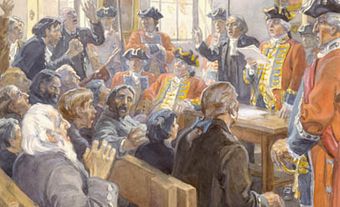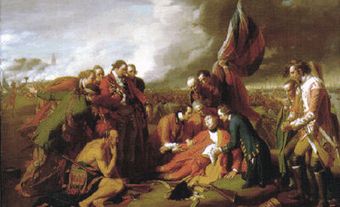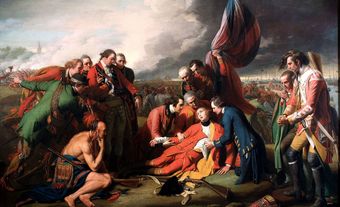The Treaty of Paris was signed on 10 February 1763 and ended the Seven Years’ War between France, Britain and Spain. It marked the end of the war in North America and created the basis for the modern country of Canada. France formally ceded New France to the British, and largely withdrew from the continent.
The Seven Years' War
The Seven Years’ War was fought from 1756 to 1763. The first war to span the globe, it was chiefly fought between an alliance of Britain, Prussia and Hanover, against an alliance of France, Austria, Sweden, Saxony, Russia and Spain.
France and Britain were especially hostile enemies, waging war on land and sea in Europe and in colonies around the world. Britain hoped to destroy France’s navy and merchant fleet, take possession of its colonies and remove France as a commercial rival.
Much of the fighting took place in North America, where the European powers clashed over possession of their colonies. The North American theatre is also known as the French and Indian War in the United States, as the conflict involved Indigenous allies on both sides.
Conquest
On 8 September 1760, Governor Pierre de Rigaud de Vaudreuil de Cavagnial, Marquis de Vaudreuil, surrendered New France (what is now Quebec, and other French territories in North America) to a British invasion force at Montreal. (See Capitulation of Montreal.) Prior to this, the Indigenous allies of the French had reached an agreement with the British at Oswegatchie (25 August) and the Huron of Lorette had done likewise at Longueuil (5 September). New France was under military occupation and military rule until a definitive treaty of peace was negotiated. (See also Conquest of New France.)
Dividing the Colonies
By the terms of the Treaty of Paris (1763), Britain obtained the French possessions of Ile Royale (Cape Breton Island), Canada (Quebec), and the Great Lakes Basin and the east bank of the Mississippi River. In accordance with the conditional capitulation of 1760, Britain guaranteed French Canadians limited freedom of worship. Provisions were made for exchange of prisoners; French Canadians were given 18 months to emigrate if they wished; and government archives were preserved.
Britain also secured the West Indian islands of Dominica, Tobago, St. Vincent and Grenada and received Florida from Spain. In compensation, Spain received part of France’s vast Louisiana territory.
France retained fishing rights in Newfoundland and the Gulf of St Lawrence and acquired the small Gulf islands of Saint Pierre and Miquelon as an unfortified fishing station. Britain also agreed to return Martinique and Guadeloupe as well as the French trading centres it had captured in India and the slaving station on the Île de Gorée (in present-day Senegal).

 Share on Facebook
Share on Facebook Share on X
Share on X Share by Email
Share by Email Share on Google Classroom
Share on Google Classroom



